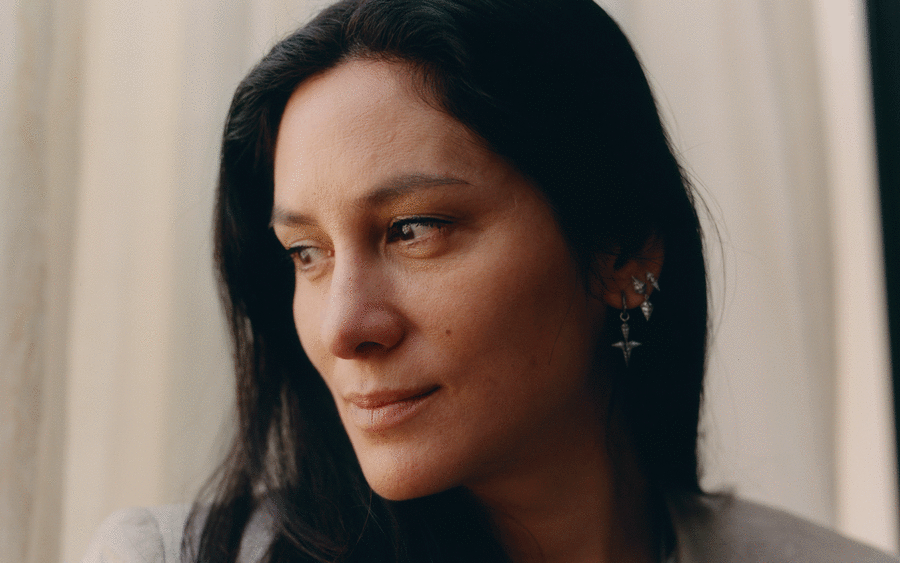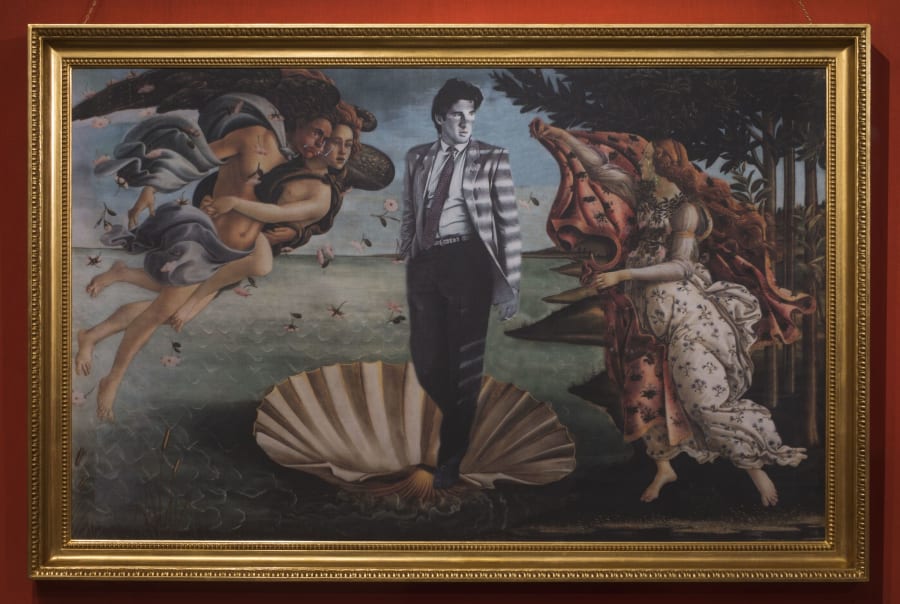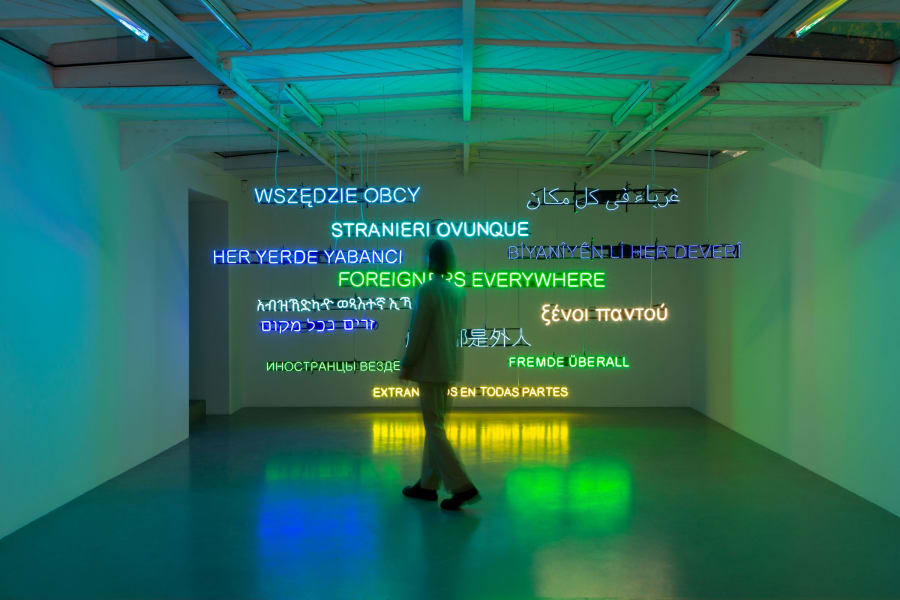Karim Aïnouz is once again about to bring his spellbinding vision to the Cannes Film Festival with Motel Destino (2024), his seventh fiction feature film – and the only Latin American movie in this year’s official selection. Shot under the blinding sun of Brazil’s Ceará coast, Motel Destino revisits the filmmaker and visual artist’s fascination with oppression, desire, and charismatic characters on the fringes of society.
Born in 1966 in Fortaleza to a Brazilian mother and an Algerian father, Aïnouz moved to New York in the late 1980s to attend the Cinema Studies program at New York University, and soon became part of the city’s queer cinema movement. Since then, he has developed a compelling body of work, shifting fluidly between experimental documentary and fiction, narrative cinema and multimedia installation. His exhibition earlier this year at DAAD Galerie in Berlin ‘BLAST!’ – which featured slide projections, photographs, film works, and miscellaneous items collected by the artist – offered an immersive voyage into his color-saturated universe. Yet, regardless of the genre or medium, Aïnouz’s work is always concerned with giving visibility to the marginalized: the gay community, black Brazilians, and women of past generations.
Unabashedly sensual and violent, his debut feature film, Madame Satã (2002), tells the true story of João Francisco dos Santos, an exuberant black drag queen and outlaw, who lived in Rio de Janeiro during the 1930s. Meanwhile The Invisible Life of Eurídice Gusmão (2019), which chronicles the lives of two sisters struggling with patriarchal repression and prejudice during the 1950s, went on to win the prestigious Un Certain Regard prize at that year’s Cannes Film Festival.
After completing Firebrand in 2023 – his first film in English, which tells the story of Catherine Parr, the last wife of King Henry VII, and stars Alicia Vikander and Jude Law – Aïnouz returned to his homeland to shoot the erotic thriller Motel Destino. The highly anticipated release is a tropical film noir, set in a roadside motel, which explores the complexities of a love triangle.
Ahead of Motel Destino’s premiere at the Cannes Film Festival, we asked Aïnouz to share some of his cultural north stars.
Which film has had the greatest impact on you?
‘There are many but I have to mention Querelle [1982] by Rainer Werner Fassbinder. I was 19 years old when I first watched it, one weekday afternoon in São Paulo. It was such a beautiful, homoerotic, and romantic film. I was becoming an adult, trying to figure out who I was and where I was going. I couldn’t imagine that the feelings I was experiencing could exist in the world, that there were others out there like me: people who liked to have sex, who liked to have fun, but who also felt sadness. Leaving the cinema, I felt I existed, that I wasn’t alone. Cinematically, it’s a highly fictional world portrayed in dazzling color, and it was thrilling to see someone dare to create such a universe.
What’s your favorite song?
‘Every time I listen to Melody of Love [1994] by Donna Summer, I want to cry and dance at the same time. I believe it’s connected to my relationship to disco music, which was so liberating for my generation: it’s queer, it’s joyous, and it’s irresistibly danceable. It’s a song that I simply adore.
Which fashion designer do you most admire?
‘Hussein Chalayan. His work transcends mere clothing: It’s as if architecture has become an extension of the human body. The shapes of his designs are always surprising. What interests me about fashion is how the silhouette captures the zeitgeist. I will never forget Chalayan’s show in 1998, when he sent six models down the runway in burkas of varying lengths, one of whom was entirely naked with only her face covered: It was so irreverent and yet so beautiful. Seeing him succeed as a queer professional in the Western fashion world, without erasing his origins and keeping his own name, was very inspiring. His accomplishments signaled to me: “Ok, we can go there as well!” That meant a lot.
Can you tell me about a location that’s meaningful to you?
‘In 2019, I went to Algiers, my father’s homeland, for the first time. There, I shot the documentary Mariner of the Mountains [2022]. Algiers carries echoes of the region where I was born in Brazil, but it’s very different. It has this sense of familiarity that I really love. During the 1960s, Algeria was referred to as the “Mecca of Revolution,” embodying an incredible moment in history where people were dreaming of a joyful future. It served as a hub for all the revolutionary movements and hosted the 1969 Pan-African Cultural Festival, which shone a global spotlight on culture and arts from across the continent. When I went there, I sought traces of that once-thriving utopian spirit which I crave so much, especially given the current state of the world. However, these traces of positivity have faded, overshadowed by an increasingly autocratic regime.
Which book has influenced you?
‘Frantz Fanon’s The Wretched of the Earth [1961]. Fanon and my paternal grandfather knew each other, and that was a great inspiration for me. He is a writer who helps you decipher the world and understand your place in it. The Wretched of the Earth really resonated with me when I went to Algiers, because I recognized the people that Fanon was talking about and his writing helped me comprehend a lot of experiences I went through. There is an important passage in his book which refers to the origins of violence in the colonial context. This reference, which I use in my film Mariner of the Mountains, allows you to understand an element of all my works: Indignation. It shouldn’t be understood as a toxic word, but as a trigger for action and change.
The 77th Cannes Film Festival will take place from May 14 to 25, 2024.
Euridice Arratia is a Paris-based writer and curator.
Captions for full-bleed images, from top to bottom: 1. Karim Aïnouz. © Karim Aïnouz. 2. Karim Aïnouz, The Invisible Life of Eurídice Gusmão (still), 2019. Courtesy of the artist. © Bruno Machado


